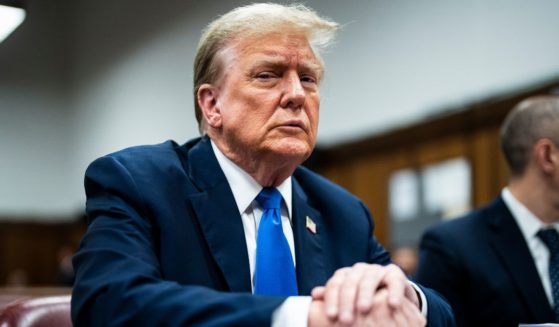Trump Deserves a Presumption of Innocence
We all know that impeachment is not a criminal proceeding. The president’s punishment, if convicted, will not be a loss of liberty, but removal from office. Yet, given the gravity of impeaching a sitting United States president, the analogy between impeachment and a criminal trial is an apt one.
The Constitution’s use of terms like “try,” “conviction,” and “high crimes and misdemeanors” when referring to impeachment bolsters the analogy, as do the Senate’s impeachment rules, which require Senators to find the accused either “guilty or not guilty.” Indeed, during President Clinton’s impeachment, his counsel argued that the Constitution’s phrasing “strongly suggests that an impeachment trial is akin to a criminal proceeding.” And during the investigation phase of the current impeachment proceeding, Rep. Adam Schiff compared his committee’s work to that of a grand jury.
Procedurally speaking, the two processes are markedly similar.
In a criminal case, law enforcement collects evidence and provides it to the prosecutor who then presents it to a grand jury. The grand jury is instructed on the elements of the crimes that the prosecutor believes the evidence supports, and the jurors then vote on whether there is a reasonable basis to believe that the defendant committed those offenses. The indictment is then filed with a court, the accused person is brought before the court to plead guilty or not guilty and if he pleads not guilty, the matter proceeds to a trial before a judge and a jury. At the conclusion of the trial, the jury deliberates and renders a verdict as to each charged offense.
Impeachment proceedings follow this blueprint. Here, the House Intelligence Committee collected evidence (mostly behind closed doors) and then forwarded that evidence to the House Judiciary Committee in the form of a 300-page report. The members of the Judiciary Committee then heard from four academics who, despite their obvious political leanings, instructed the members on their understanding of the law surrounding impeachment. On Wednesday, the full House of Representatives voted to impeach – or formally charge – President Trump with “abuse of power” and “obstruction of Congress.”
Soon, the Articles will be transmitted to the Senate where the president will have to respond to them, by pleading guilty or not guilty. Upon a plea of not guilty, the House will appoint a team of lawmakers, known as managers, to play the role of prosecutors, and a jury trial will be held in the Senate, presided over by the chief justice of the U.S. Supreme Court with the senators serving as the jury. At the conclusion of the evidence, the Senate will deliberate and render a verdict.
The Constitution guarantees that those who have been accused of a crime are innocent until proven guilty.
Perhaps because of the similarity between a criminal prosecution and an impeachment, House precedent has applied the presumption of innocence to impeachment proceedings. This makes sense because the presumption is based on the Constitutional guarantee of due process, which applies whenever the government tries to take away your life, liberty or property. In the eyes of the law, impeachment – which, at the bottom, is the government’s attempt to take away a duly-elected president’s job – falls squarely within the latter two categories.
This is important because, based on the presumption of innocence, judges in criminal cases instruct the jury that if two reasonable inferences can be drawn from the evidence, one consistent with innocence and one consistent with guilt, the jury must draw the inference consistent with innocence.
In other words, as they say in baseball, the tie goes to the runner.
Because the president is entitled to a presumption of innocence in the context of impeachment, the “two inference” rule also applies in such a setting.
This fundamental legal principle should have been a game-changer, but instead, it was all but ignored by the Democrats, the mainstream media and even Republicans who simply are not familiar with the law.
The essential facts underlying the current impeachment imbroglio are not disputed. During a July 25 phone call between President Trump and Ukrainian President Volodymyr Zelensky, President Trump raised the fact that Joe Biden had publicly bragged about threatening to withhold $1 billion in U.S. loan guarantees from Ukraine unless the former Ukrainian president fired a prosecutor who was leading a corruption probe into Burisma, a notoriously corrupt Ukrainian gas company. At the time, Biden’s son, Hunter, served on the company’s board to the tune of $50,000 a month. President Trump also raised the fact that he had heard that Ukraine had interfered in the 2016 presidential election. He suggested that Zelensky look into both matters.
One week before the call, and unbeknownst to Zelensky at the time of the call, President Trump had directed that $400 million in military aid to Ukraine be temporarily suspended. The hold on the military aid was lifted in September without Ukraine ever announcing any investigation into Burisma or the Bidens.
From these facts, Democrats argue that we should infer that that Trump blocked aid to Ukraine with a “corrupt motive”: to force Zelensky to publicly announce an investigation into former Vice President Joe Biden, a potential Democratic general election opponent, in order for Trump to gain a personal political advantage.
Conversely, Republicans contend that President Trump had innocent reasons for withholding military assistance that had nothing whatsoever to do with domestic politics: He was reluctant to provide taxpayer money to a country with a long history of pervasive corruption without proof that it was taking steps to address the problem, especially given that Biden had publicly bragged about using his office and $1 billion dollars of U.S. aid to coerce Ukraine into firing the prosecutor who was investigating Burisma. Indeed, the 2019 National Defense Authorization Act that authorized the aid to Ukraine expressly conditioned Ukraine’s receipt of aid money on the executive branch’s certification that Ukraine had taken “substantial actions” to implement reforms to decrease corruption.
The Democrats’ impeachment putsch – er, push – therefore calls for a probe of President Trump’s mind. As the House Judiciary Committee stated in its 658-page report, “The question is not whether the President’s conduct could have resulted from permissible motives. It is whether the President’s real reasons, the ones in his mind at the time, were legitimate.”
The Democrats claim that President Trump’s explanations were pretextual and that he really had an “improper state of mind” and a “corrupt intent” when he spoke with President Zelensky.
The problem is, there’s no evidence of that, let alone direct evidence. The only direct evidence of President Trump’s state of mind strongly favors the president. President Trump has forcefully asserted that his motives were pure during the call with Zelensky. And Ambassador to the European Union Gordon Sondland testified that President Trump explicitly told him, “I want nothing. I want nothing. I want no quid pro quo. Tell Zelensky to do the right thing.”
Nevertheless, the Democrats contend that House members and senators should infer that President Trump had corrupt motives based on nothing more than the fact that Biden, a potential political opponent of Trump, is seeking the Democratic Party nomination for president. That is not evidence, but argument.
To be sure, the only reasonable inference to be drawn from the facts is that President Trump is innocent of the articles with which he has been charged. But even if two reasonable inferences hypothetically could be drawn from the facts, one consistent with innocence and one with guilt, our Constitutional system requires our legislators to choose the one consistent with innocence.
Had the Democratic Members of Congress done so – had they lived up to their oath to support and defend the Constitution and to bear true faith and allegiance to it – this impeachment would have ended before it began.
Instead, by voting to impeach, the House bucked the law to serve a political agenda. House Democrats, not President Trump, are the ones serving up pretextual explanations for their actions – pretending to be defenders of the Constitution when, in fact, they are its saboteurs. They, not Donald Trump, are the ones acting with corrupt motives, having placed the president’s impeachment at the top of their agenda since the day he was elected (see here, here, here, here and here).
As this impeachment sham heads toward a Senate trial, we must remember – and educate others – that the president is entitled to the inference of innocence. We also should remember that, at the ballot box in November, those Democrats who sacrificed the law on the altar of party are not.
The views expressed in this opinion article are those of their author and are not necessarily either shared or endorsed by the owners of this website. If you are interested in contributing an Op-Ed to The Western Journal, you can learn about our submission guidelines and process here.
Truth and Accuracy
We are committed to truth and accuracy in all of our journalism. Read our editorial standards.












